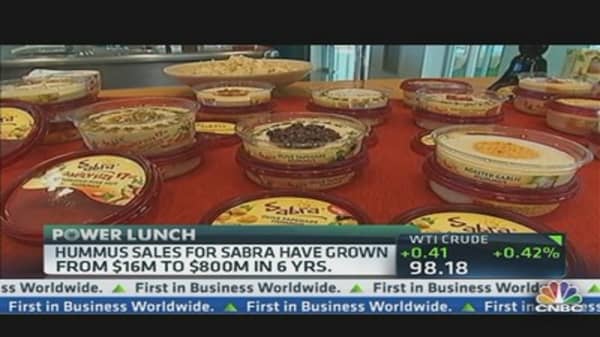Sabra isn't the only large-scale hummus manufacturer on the market, but its sales dwarf other players like Kraft-owned Athenos.
Zohar credits much of the success to PepsiCo. "They have a lot of knowledge about consumer habits and how to approach the consumer, so we leverage the Pepsi capabilities, its consumer research, transportation, all kinds of support we get from Pepsi," he said.
While the top line is growing double digits annually, Zohar will not report what's happening with the bottom line, other than to say, "We are very happy with our results."
Some of the company's profits have been plowed into an $86 million expansion of Sabra's facilities in Virginia, including a research and development lab. Here the company is figuring out what new flavors might entice Americans to eat hummus, and what chickpeas will bring the best yields in the U.S. to help Sabra ramp up to meet demand.
(Read More: It's Spring, but Christmas Tree Growers Feel Scrooged)
"One of the reasons we started doing all kinds of research is to find how to grow chickpeas in other places in the states, like in Virginia, where we are right now," said Zohar. Sabra has approached local tobacco farmers to talk about replacing their traditional crop with chickpeas.
How much growth is left? The CEO said hummus has only penetrated about 20 percent of the U.S. market. "The next step is to try to introduce (hummus) to children as a spread and to take the 20 percent and make it 40 percent."
The company's success has not gone unnoticed in other parts of the Middle East. The Huffington Post reports some Lebanese are grumbling that Israel has co-opted what they consider a Lebanese staple.
"To quote a saying that has surfaced on the Internet, 'First our land, then our hummus,'" reported Saki Knafo, who added that Zohar replied, "I am very happy if Lebanon is going to fight about the hummus and not about anything else."
—By CNBC's Jane Wells; Follow her on Twitter @janewells.





